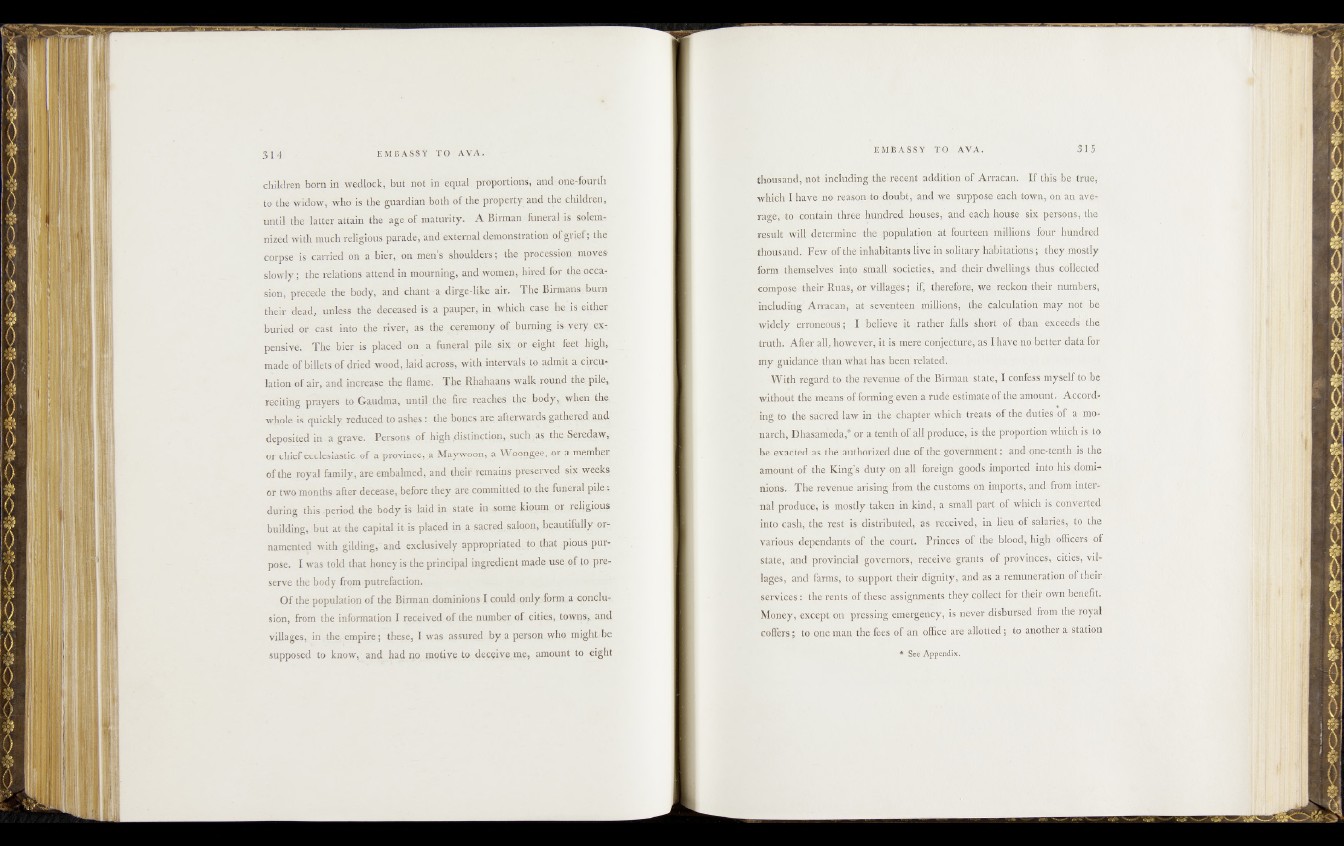
cfrrlchiert bam in wedlock, but not in equal, proportions, ■ and:qoe.-foiffth
to the widow, .who? is the guardian both of .the property and:t^e,Gbijdren»
untifcthe- M te ra tta in the age o fd d k ^ k y . A B irman fbneral is *& » »
n kedwifh much religious parade, and external demonstration’ of grief; the
corpse is earned oh a bier, on men’s shoulders; the ptoces^@ttt.ni9Year
slowly-; the relations attend in mourning, and-WhUjen,- hired'fer ,thepepa-
sion, giseeede the body, and chant-a dirge-like air:. .The Birmans, burn
their dead,. unless the deceased is a pauper,, ifr^whiph case he.is .either
buried « cist into the river, as .th e . ceremony oEjbupnihg is very ex-
pensive; The bier is placed on a % |e r4l; pile six o?I;eigt$ % t high»
made of billets of dried w o o d ,,la id a c ip s i^ » t p -
lation ofair* and increase the flame. The Rhahy.ans .walkirqwtd.&®.J>iles
reciting prayem- to Gaudma, untjFfhe fire reaches;ithe.,bodyijis when the,
whole is quickly reduced to ashes: the bones are afterwards gathered and
deposited in • a grave. Persons- of high distinction such as. the Seredaw,.
or chief ecclesiastic of a province, a Maywoon, a Woongee, or a member
of the royal family, are embalmed, and their remains preserved six weeks
or two months- after decease, before they are committed to the funeral pile :
during this .period the body is laid in state in- some kipum or religious
building, but at the capital it is placed in a sacred, saloon, beautifully-ornamented
with .gilding, and exclusively appropriated, to that Tpious purpose.
I was told that honey is the principal ingredient made use of to pr.e-.
serve the body frqm putrefaction.
Of the population of the Birman dominions I could, only.form, a conclusion,
from the information I-received, of the. number Qf;citje.s,. towns,. and
villages, in. the, empire; these, I was assured. fejfA pexsou.yyhq. im^hjt/be
supposed to know, and bad tio. motiye to deceive, me, amount to eight
thousand, ttiot-mcJujUni^S-ltciHtiUt .addition J-in, >d;f this-hie+troe,
which I base rip1 .jsJjndMij- -suppose' C/icli ty,vn, onirmfrvevfrfgojitoscontain
thicc.hujiSiLi.d'hojiisc*., .yid.c tch house six peppns,vth&
Jesuit wƒ!ijiift-ft<rrtfi-nevt-lie^pqpifd Ltion1 at-,fehrygfrkmihadns^MkhuH.dted
thousand. Few of theti^hateaat A u eM ^ o lto y > |m itatiQas;«dhey .mostly
form- thfrrn.cjp.lxres' .i.nftri ffim'aJfc sqcifedesy.' a-nd»»t e ^ dwelllng's: thus ccilk^ied
leoxnpose their Ruaspfflp^riHages; ii, fiicijdoKC^Snifreckon then gnpnbeks!
isadudfrig' Arjaean,...Rt-[Sgve&tg,en,4mfli(ja& ihi^y'JXjUljiJ.ion md.y\nQt ,bo
erroneous'; I .th e jS p p 4 |^ ^ |0K:btdliksbfqrf.oh than e x e a t s !t-li.d
troth. After afl,'hcTOyeE;&is'mLiorconjcetaVc*iassIfli,u e no hateindaiGcAfoi
my guidancertharf-what-.hasfjheenf’rel^tediH; - ’ ■
, With regard:‘to'.the revenue o f the(dMroppnfiSt^tS«I confes sem^s elfito .be
without the incans <>1 forming uvchiasrude esVimare-qfilho-ariiounl bAt-coidi
aiig^to ;thp «sa'crgd law in ,tfae pfraptert which - treats', ties ?o f a-unos,
natch, JDhd,sameda,* or in tenth ol.allproduc. ^ t l i c pnjjoitimuYUk'Ji is (tq
be exacted as the ^authorized due of the g d^fnment; phdmjQPiteiithttiS'khe
amount ol the King’s duty on all foreign goads nnpoi tul into lustdouu-
nions. The revenue arising- feoiffi-the.customs,on imports, did* (loin imcv-
n d produce, re mostly taken m kind," a small part,oi\wHn'h js'x,on\ cited
into cash, the rest is-;distributed, as-iecei\ed, iii'-hcu%Ks.daH‘e'si to,the
^pridus dependants of the c o u rt;' prance)} of ihe^blmxl. hrgftyolbeers ot
state, and provincial governors;'receive giants of(jji.Q\mcbs,- bides. v i llages,
and farms, to support their dignity, and as a icmuncratioii nbjjiui,
„services: the rents 6f these assignments they collect for (heir own.l^rait?-
Money, except on pressing emergency, is ncvci disbuisul lions thc^j.o,\al'
coffers; to oneman the fees of an office'jitll allotted;*. tp anothet-^ station
Sei Appendix.